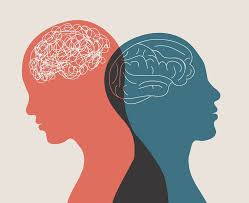Advertisements
Maintaining good mental health is essential for a balanced and fulfilling life, but warning signs often go unnoticed. In the fast-paced world of everyday life, it is common to neglect taking care of our minds, ignoring symptoms that may indicate the need for attention. This post goes beyond the superficial and delves deeper into identifying the warning signs of mental health, providing valuable insights on how to recognize when something is not right.
Exploring the connection between mind and body is essential to understanding how our mental state directly influences our physical well-being. Untreated emotional tension can manifest itself in physical symptoms, impacting our overall quality of life. In this space, we will address the nuances of this interrelationship, highlighting the importance of a holistic approach to achieving the desired balance.
Advertisements
Identifying the warning signs is just the first step. It’s also crucial to know where and how to seek help. This article will guide you through the various options available, from specialized professional support to community and digital resources. The goal is to empower you to take control of your own well-being, promoting a healthier and more fulfilled life.

Understanding Mental Health Warning Signs
Sometimes our mental health can send us signals that something is not right, but we are not always aware of what these signals might mean. It is important to pay attention to changes in behavior and mood, as these can be signs that we need to pay more attention to our mental well-being. Here are some common warning signs:
Advertisements
- Changes in appetite or sleep: Sleeping too much or having insomnia, as well as a significant loss or increase in appetite, can be indicators that something is not right with your mental health.
- Difficulty concentrating: If you're finding it difficult to concentrate on simple tasks or if your mind always seems to be elsewhere, it could be a sign of stress or anxiety.
- Loss of interest in activities: When things that once brought you pleasure now seem boring, it could be a sign of depression.
- Feelings of persistent sadness: We all have bad days, but if you've been feeling sad or empty for an extended period of time, it's time to pay attention.
These signs can vary from person to person, and it is essential to remember that they are not a personal weakness, but rather a call to take care of yourself. 🌱
Where to Seek Help for Mental Health
Recognizing that you need help is an important and courageous step. Fortunately, there are many resources available to support your journey toward mental wellness. Here are a few options:
- Mental health professionals: Psychologists and psychiatrists are trained to help manage mental health issues. Seeing a specialist can provide valuable insights and effective coping strategies.
- Support groups: Joining support groups can be a powerful way to share experiences and learn from others facing similar challenges.
- Support lines: Many organizations offer helplines where you can speak to someone trained to listen and help without judgment.
Seeking help is an act of courage and self-care, and it's important to remember that you're not alone on this journey. 🤝
Self-Care Strategies to Promote Mental Well-Being
While seeking professional help is crucial, integrating self-care practices into your daily routine can make a significant difference in your mental health. Here are some strategies that can help:
- Regular physical activity: Physical exercise not only improves physical health, but is also an excellent way to release endorphins, the feel-good hormones.
- Meditation and mindfulness: Mindfulness practices can help calm the mind and reduce stress.
- Social connections: Staying connected with friends and family can provide emotional support and increase a sense of belonging.
- Hobbies and interests: Spending time on activities you love can bring joy and a sense of accomplishment.
Remember that self-care is an ongoing journey and that small changes can lead to big improvements. 🌟
Recommended Articles
The Role of Nutrition in Mental Health
Nutrition plays a vital role not only in your physical health, but also in your mental well-being. The way we eat can influence our mood, energy levels, and ability to cope with stress. Here are some tips on how nutrition can impact your mental health:
- Foods rich in omega-3: Fish like salmon and sardines, as well as walnuts and flax seeds, are excellent for the brain and can help combat depression.
- Fruit and vegetable intake: A diet rich in fruits and vegetables provides essential vitamins and antioxidants for brain health.
- Proper hydration: Staying hydrated is crucial for optimal brain function. Dehydration can affect mood and concentration.
- Moderation in sugar and caffeine: While sugar and caffeine can provide a quick boost of energy, excessive consumption can lead to fluctuations in mood and energy levels.
Eating well is a fundamental part of a balanced lifestyle and can be a great ally in promoting mental well-being. 🥦
Practicing Gratitude to Improve Mental Health
Practicing gratitude is a powerful tool that can transform the way we perceive the world and our own mental health. Studies show that people who practice gratitude regularly experience less stress and have a more positive outlook on life. Here are some ways to incorporate gratitude into your routine:
- Gratitude Journal: Take a few minutes each day to write down three things you’re grateful for. This can help shift your focus to the positive and boost your emotional well-being.
- Expressing gratitude: Tell the people around you how much you appreciate them. This strengthens relationships and creates an environment of mutual support.
- Mindfulness and gratitude: During your meditation practice, take a moment to reflect on what you appreciate in life. This can improve emotional resilience.
Practicing gratitude may not solve all problems, but it is an effective tool for cultivating a more positive and resilient mindset. 🌻
Overcoming Mental Health Stigma
Unfortunately, the stigma surrounding mental health still exists and can be a significant barrier to those who need help. It’s important to demystify mental health issues and understand that they are part of the health spectrum, just like any other physical condition. Here are some ways to combat the stigma:
- Education and awareness: Educating yourself and others about mental health can help dispel myths and reduce prejudice.
- Share stories: When people share their personal experiences, it helps normalize the conversation around mental health.
- Encourage dialogue: Creating safe spaces for open discussions about mental health can promote understanding and support.
By working together to overcome stigma, we can create a more welcoming and understanding society for everyone. 💬
Conclusion
In conclusion, maintaining a healthy mind is essential to a healthy body and overall well-being. It is crucial to be aware of mental health warning signs, such as drastic mood swings, social isolation, and changes in sleep patterns or appetite. Recognizing these symptoms is the first step to seeking help. Understanding that mental health is just as important as physical health helps us prioritize self-care and seek support when needed.
There are many ways to get help, whether through mental health professionals, support groups or online platforms. The important thing is not to hesitate to seek help if you notice any signs of emotional or psychological distress. This shows strength and courage, not weakness.
Additionally, incorporating practices such as meditation, regular exercise, and a balanced diet can be extremely beneficial in maintaining a balance between mind and body. Therefore, by taking care of your mental health, you are investing in a healthier and happier future.
In short, recognizing the warning signs and seeking support are fundamental steps to ensuring a full and balanced life. Let's prioritize our well-being and promote a society where mental health is treated with the same importance as physical health. 🌱💪




